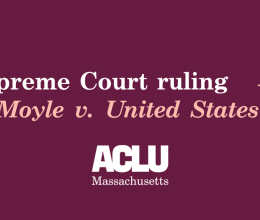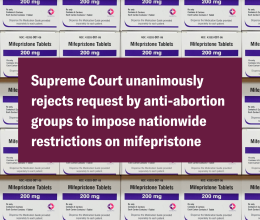
A conference committee today advanced its version of a comprehensive abortion access bill, which will now head to the House and Senate for final procedural votes before being sent to Governor Baker’s desk. The bill–which follows Senate and House investments to protect abortion providers and patients–includes several key components of the Massachusetts Beyond Roe Agenda:
- Critical protections for Bay Staters who provide or help someone access reproductive health care and gender-affirming care;
- A requirement that insurance cover abortion and abortion-related care. The bill also ensures coverage is affordable—and not subject to cost sharing—for low income individuals;
- A requirement that Massachusetts public colleges and universities provide medication abortion at campus health centers;
- A statewide standing order for both prescription and over-the-counter emergency contraception, making no-cost insurance coverage possible for all forms of emergency contraception without delay;
- A confidential address program for reproductive health care and gender-affirming care providers who too often face threats and violence for providing health care; and
- Language to clarify the ROE Act and ensure pregnant people do not have to leave Massachusetts for abortion care later in pregnancy.
“This is a very important, very timely, and very powerful bill, and it will have an immediate positive impact on thousands of people's lives. We thank House Speaker Ronald Mariano and Senate President Karen Spilka for their commitment to reproductive freedom in this moment of crisis, and we thank the conference committee Chairs Aaron Michlewitz and Cindy Friedman for acting with urgency,” said Carol Rose, Executive Director of the ACLU of Massachusetts. “In the wake of the Supreme Court’s devastating decision, millions of people across the country have lost the right to abortion, while doctors live in fear that providing care will land them in prison. Our legislature has worked relentlessly to make Massachusetts a beacon for people who need and provide abortion care. When it lands on his desk, Governor Baker should promptly sign this bill into law, ensuring that abortion is available, accessible, and affordable to all in Massachusetts.”
“Today, Massachusetts is standing up against hostile state legislatures across the country that have passed extreme anti-abortion bans, threatened providers across borders, and made travel for abortion care more dangerous than ever before,” said Rebecca Hart Holder, Executive Director of Reproductive Equity Now. “This historic bill will protect helpers and doctors who provide lawful, lifesaving abortion and gender affirming care, expand access to emergency contraception, and ensure that no one has to leave Massachusetts to obtain abortion care—at any point in their pregnancy. We thank Senate President Karen Spilka, House Speaker Ronald Mariano, and Conference Committee Chairs Aaron Michlewitz and Cindy Friedman for this tremendous report that will make Massachusetts a beacon for reproductive equity. Now, we urge the Legislature to pass this package swiftly and call on Governor Charlie Baker to sign these protections into law immediately.”
“This bill unequivocally affirms that abortion is health care, and that zip code, income, or identity should not be a barrier to care,” said Dr. Jennifer Childs-Roshak, President & CEO of Planned Parenthood League of Massachusetts. “We are grateful to Speaker Mariano, Senate President Spilka, and the conference committee for taking urgent action in the face of the Supreme Court’s unprecedented assault on reproductive freedom to protect providers and patients and expand access to abortion care. Until these protections are enshrined into law, providers and patients in Massachusetts will live in fear of repercussions from regressive laws passed by other states. We urge the Legislature to pass this historic bill and Governor Baker to promptly sign it into law."
The recent ruling in Dobbs v. Jackson Women’s Health Organization overturns landmark privacy and abortion protections enshrined in Roe v. Wade. The effects are immediate and far-reaching: Because of the Supreme Court’s decision, nearly a dozen states are taking steps to enforce abortion bans across the country, and that number is expected to grow to ultimately include half the states.
In Massachusetts, the ROE Act codifies the right to abortion into state law, recognizing abortion as a fundamental right and ensuring it will remain legal. But barriers to care—including exorbitant costs, complicated insurance coverage, and provider access deserts—still exist in the Commonwealth, especially for low-income communities, communities of color, and immigrant communities.
Following a leaked draft opinion from the Supreme Court overturning Roe v. Wade, the Beyond Roe Coalition—led by the ACLU of Massachusetts, Planned Parenthood Advocacy Fund of Massachusetts, and Reproductive Equity Now—launched an advocacy agenda to protect and expand abortion access in Massachusetts. The Massachusetts Beyond Roe Agenda includes 21 legislative solutions, budget investments, and regulatory actions that state leaders can take to ensure Massachusetts remains a beacon for reproductive freedom.






